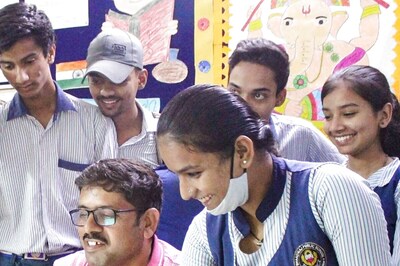As Interim Results of 3 Covid-19 Vaccines Emerge in Quick Succession, Here is What These Trials Mean

views
The world has been awaiting positive news amid the gloom of the Coronavirus pandemic. The interim results of three leading Covid-19 vaccine candidates, two from US and one from UK, emerged in quick succession, raising hopes of an end to the pandemic in the near future. But what do these interim results mean? Will the early indications of effectiveness hold? News18 explains:
What were the interim results of vaccine trials of vaccines in US and UK?
In a span of one week, the world received news on the high efficacy range of Covid-19 vaccine candidates. Two of these vaccines – made by Pfizer-BioNTech and Moderna – are from the US and the one, from UK, was developed by Oxford University and AstraZeneca, a biopharmaceutical company.
Pfizer announced last Wednesday that their mRNA-based vaccine candidate, BNT162b2, met all of the study’s primary efficacy endpoints and analysis of the Phase-III trial data indicated a vaccine efficacy rate of 95% in participants without prior Coronavirus infection and also among those with the infection. Only one severe case was noted in the group that received the vaccine while nine cases severe cases were noted among those that received a placebo in the trial.
Before Pfizer, Moderna, whose vaccine has been funded by the US government, had announced that the Phase-III trial of its vaccine candidate met the statistical criteria pre-specified in the protocol for efficacy, which stood at 94.5%. The efficacy was based on analysis of 95 cases, of which 90 cases of Covid-19 were observed in placebo group against 5 in the group receiving he vaccine.
On Monday, Oxford-AstraZeneca announced that their vaccine candidate had achieved 90% efficacy in a one dose regimen among 2,741 people when given as a half dose and following the second dose a month apart, the efficacy was 62%. The combined analysis resulted in an average efficacy of 70%.
What does clinical efficacy mean and why are the interim results encouraging?
Each clinical trial testing the Covid-19 vaccine candidates undergo three phases of the trials. These phases test for the safety, immunogenicity (the immune response a vaccine triggers) and efficacy, which ultimately reveals if the vaccine prevents the infection from progressing to the stage of disease, which in the case of a Coronavirus infection is the Covid-19 disease.
Clinical efficacy is considered as one of the most crucial markers of a vaccine’s effectiveness, others being prevention of transmission of infection and prevention of infection. The World Health Organization has set an acceptability benchmark of 50% benchmark for vaccine candidates.
Clinical scientist and India’s leading vaccine scientist Professor Gagandeep Kang said that the estimate of efficacy is based the number of cases you are counting in each trial and on the infections seen among the trial group that receives the vaccine against the infections observed among those who got a placebo or a comparator.
“If the number of infections is fewer among the group that has received the vaccine, then it shows that the vaccine is working. How well it is working depends on the number of cases in each group,” Kang said.
“Let’s suppose that ten people got infected in the vaccine group and 100 got infected in the group that did not receive the vaccine, then vaccine is 90% efficacious,” added Prof.Kang.
Kang also cautioned that regulators should make a clear distinction between vaccines that are immunogenic and those that show clear clinical efficacy. “Efficacy in the induction of antibody does not mean anything more than that a certain vaccine is immunogenic. The question to ask, does it prevent disease?”
Could the efficacy change as trials progress?
The announcements made by all three companies are based on interim results that have not yet undergone peer-review and have not been published in the form of a scientific paper. The trials of the Oxford-AstraZeneca vaccine are underway in UK and Brazil and a bridging trial is underway in India through Serum Institute of India, Pune, and Indian Council of Medical Research.
Prof Kang said that the even as the trials are ongoing, the range of efficacy provided in the interim results is a good measure. “Around everything that we do, there is a range. The range is indicates how it may work in real life. If I were to test the vaccine in real life, would we have the same results or not? The range tells you that 95% of the times, it would be within this range. That is what they call confidence intervals,” said Prof Kang
It is also yet unknown how long these vaccines would be effective in preventing Covid-19 disease.
“We still do not know exactly how these vaccines will fare by the time the trials end. These results are not peer reviewed, not submitted to regulators yet. The trial itself has to be completed and published,” K Srinath Reddy, President, Public Health Foundation of India.
Is data from domestic trials necessary for regulatory approvals?
So far, the Indian government has hinted that the US vaccine candidates are not viable for India and thus hopes are pinned on the Oxford-AstraZeneca vaccine and the indigenous Covaxin, developed by Bharat Biotech in collaboration with ICMR.
Serum Institute of India, which is mass manufacturing the Oxford vaccine as well as the vaccine it has developed with a master seed from Oxford, may need to submit the complete data of Phase III trials underway in India before it gets approval.
Experts said that this would be ideal, especially from the point of view of safety considerations. “As far as our regulators are concerned, they should evaluate international as well as domestic data of trials because safety considerations are sometimes variable across populations. You cannot go only by international data, specifically on the safety issue. Nothing should get approval without adequate regulatory scrutiny,” said Reddy.
Read all the Latest News, Breaking News and Coronavirus News here




















Comments
0 comment